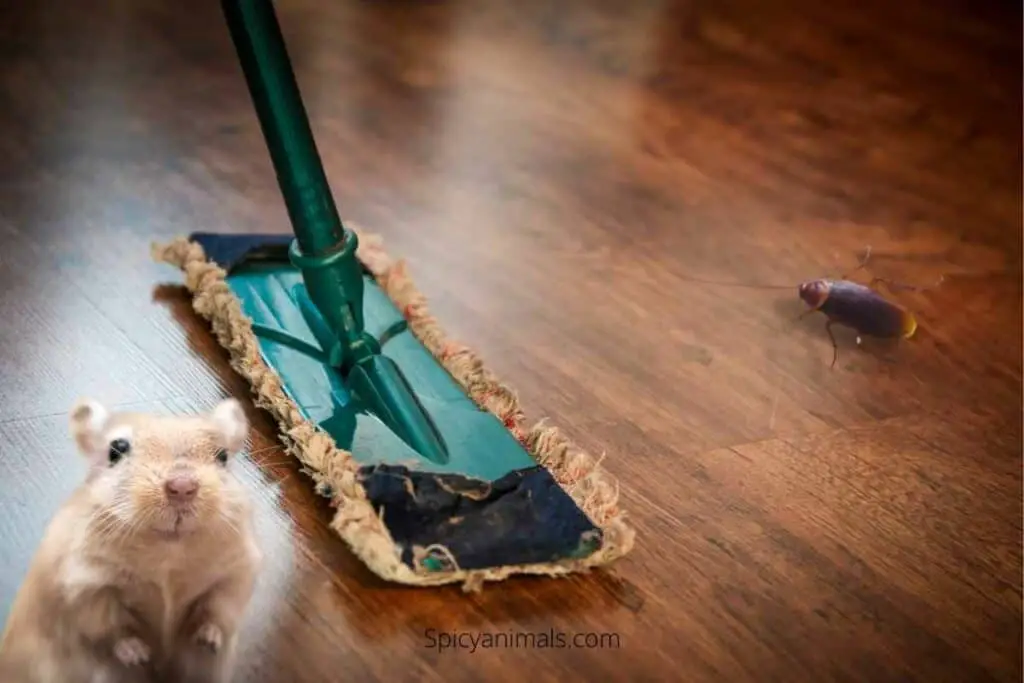Are your gerbils throwing nocturnal parties you didn’t sign up for? Fear not! Our guide on ‘How to Keep Gerbils Quiet at Night’ is here to save your sleep and sanity. Discover simple, stress-free strategies that promise quieter nights. And remember, earplugs are the last resort!
Table of Contents
The Common Noises Gerbils Make
Ready for the “gerbil symphony” that serenades you throughout the day and night? Yes, our little friends, though small, are far from silent! Gerbils are active, especially when the moon shines bright, turning their cage at night into a mini concert hall. Here’s your guide to the common noises that gerbils make:
- Chewing: Gerbils have to chew – it’s their version of a toothy workout! With teeth that never stop growing, gnawing on wooden chew toys or cage bars is essential to keep their teeth in check. Be prepared, the sound of relentless munching can keep you awake, especially when the world around you is still.
- Digging: Imagine being a gerbil, burrowing your way through the day and night. Yes, they’re natural excavators, creating mini metros within their enclosure. This translates to soft rustling or scratching sounds in your room, often mistaken for a tiny ghost!
- Wheel-running: Think of gerbils as fitness enthusiasts who love their cardio! Running around in their wheel, they can be noisy at night. Remember to keep the wheel well-oiled to avoid the squeaky serenade that can interrupt your sleep cycle.
- Thumping: Now, this is gerbil Morse code! Gerbils will sometimes thump their hind legs, creating rhythmic drumming. It’s their way of saying, “Danger, Will Robinson!” If it’s your first time hearing it, it might take a nap’s worth of time to get used to it.
Understanding these noises is a stepping stone towards a less noisy night with gerbils in your room. As we delve further, we’ll explore how a white noise machine or fan, the right kind of substrate, or even moving the gerbil cage to a different room can help drown out the “gerbil concert”. Stay tuned as we help your gerbil (and you) get to sleep, even when they feel like giving a performance!
Factors That Contribute to Noisy Gerbils
We’ve explored the gerbil orchestra, now let’s understand what might make your gerbils noisy at night. Knowing the root causes can help us address the noise without compromising the happiness and health of our furry friends.
Hunger: Gerbils love to eat, and when their food bowl is empty, they turn into tiny, squeaky alarm bells! Ensuring a constant supply of appropriate food, like a mixture of hay and sunflower seeds, could help reduce the clamor.
Boredom: Gerbils are curious creatures, active during the day and night. When bored, they might become louder, just to keep themselves busy. Enrich their environment with toys, tunnels, and shredded paper for their foraging fun to pursue quieter activities.
Fear or Stress: Fear or stress might have your gerbils thumping their hind legs as a warning. Sudden loud noises or changes in their environment could trigger this. A stable, well-ventilated cage, perhaps a glass tank, can help them feel safe and reduce noise.
Health Issues: Increased noise could signal health issues. If your gerbils are in discomfort, they may make more noise. Notice sudden changes in their behavior? It might be bedtime for a vet visit.
Remember, our goal isn’t to silence our gerbils. These sounds are their way of communication and are as normal as them being active at night. We aim to manage issues causing excessive or distressing noise, for the sake of our gerbils and our peace. Up next, we’ll discuss practical ways to strike this balance.

Practical Ways to Keep Gerbils Quiet at Night
Understanding the causes behind our gerbils’ nocturnal symphony, let’s explore some practical ways to create a peaceful nighttime environment. We aim to balance our gerbils’ active and curious nature with our need for a quiet sleep at night. Here are some strategies:
Providing Appropriate Toys: Gerbils need mental and physical stimulation. Chew toys, tunnels, and climbing structures can keep them occupied. Ensure these toys are safe and suitable for gerbils, and consider quieter toys for nighttime use.
Ensuring a Balanced Diet: A well-fed gerbil is a quieter gerbil. Ensure they have a steady supply of appropriate food, such as a good quality gerbil mix and fresh vegetables.
Maintaining a Comfortable Environment: Gerbils are sensitive to their environment. Factors like temperature, lighting, and noise can affect their behavior. Placing the gerbil cage at night in a quiet, dimly lit area may encourage quieter behavior.
Regular Exercise and Stimulation: Regularly taking your gerbils out of their cage for supervised playtime helps burn off energy and might reduce their activity (and noise) levels at night.
Remember, every gerbil is unique. What helps one gerbil to sleep might not work for another. It may take some trial and error to find the strategies that best quieten your gerbils. But with patience and understanding, you can create a more peaceful nighttime environment for both you and your gerbils. Up next, we’ll delve into specific strategies to reduce noise. Stick around!
Specific Strategies to Reduce Noise
We’ve discussed general strategies to help your gerbils sleep and reduce their noise at night. Now, let’s delve into specific tactics to further quieten their active nighttime behaviors:
Choosing the Right Cage and Accessories: The type of cage and its accessories significantly affect noise levels. Opt for a cage with solid walls to help muffle any noise from your gerbils chewing on the cage walls. Consider accessory materials as well – wooden wheels can be quieter than metal or plastic ones.
Positioning of the Cage: The cage’s location in your home can impact the noise levels. Positioning the gerbil cage at night in a quiet, low-traffic area might reduce the noise your gerbils make in response to external stimuli.
Using Noise-Dampening Materials: Noise-dampening materials around the cage can help reduce sound. This could involve placing a rug under the cage to absorb sound or covering the gerbilarium at night to muffle noise.
Training Your Gerbils: With patience, it’s possible to train your gerbils to be less noisy. This could involve rewarding them for quiet behavior or gently discouraging loud activities. Always use positive reinforcement and avoid punishing your gerbils.
These strategies can create a peaceful nighttime environment while ensuring the well-being of your gerbils. Stay tuned as we next explore understanding and responding to your gerbil’s noises.
Understanding and Responding to Gerbil Noises
Understanding and responding to gerbil noises are crucial aspects of responsible gerbil ownership. Let’s discuss how to interpret different sounds:
Interpreting Different Noises: Various noises can indicate different needs. Chewing could mean they’re hungry or need something to gnaw for dental health. Thumping usually indicates stress or fear. Digging and running are part of their natural behaviors. Recognizing these sounds can help you understand and meet your gerbil’s needs.
When to Seek Veterinary Advice: Sometimes, unusual or increased noise can indicate a health problem. If your gerbil is making more noise than usual or a new sound, consult a vet. It’s always safer to be proactive regarding the health of our furry friends.
Understanding your gerbil’s noises isn’t just about keeping them quiet—it’s about ensuring their well-being. Listening and understanding their sounds can build a stronger bond with your gerbils and provide better care. In the next section, we’ll discuss the impact of noise on gerbil health and well-being. Don’t go away!
The Impact of Noise on Gerbil Health and Well-being
We’ve extensively discussed how to keep your gerbils quiet for our peace, but it’s crucial to consider the impact of noise on our gerbils’ health and well-being. Let’s delve into this:
How Excessive Noise Can Affect a Gerbil’s Health: Just like us, gerbils can be impacted by excessive noise. High noise levels can stress gerbils, leading to various health issues from decreased immune function to behavioral changes. If your gerbils make a lot of noise consistently, they might be feeling stressed or uncomfortable.
The Importance of Quiet Time for Gerbils: Although gerbils are naturally active and can be noisy, especially at night, they also require quiet time. This is especially true during their sleeping hours (typically during the day). By providing a peaceful environment, you can ensure your gerbils get the rest they need for their health and well-being.
Balancing Gerbil Activity and Rest: The key lies in the balance. Gerbils need to express their natural behaviors like digging, chewing on wood toys, and running, but they also need rest. By offering appropriate outlets for their energy and ensuring they have a quiet place to take a nap, you can help maintain this balance and promote their overall well-being.
Remember, our goal is to create an environment that caters to our gerbils’ needs while allowing us a good night’s sleep. In the next section, we’ll address some frequently asked questions about gerbils and noise. Don’t go away!
Frequently Asked Questions About Gerbils and Noise
As we conclude our exploration of gerbils and their nighttime noises, let’s address some frequently asked questions. These are queries gerbil owners often have, and we hope these responses will provide some additional clarity.
Can Gerbils Be Trained to Be Quiet at Night? While completely changing a gerbil’s natural behavior isn’t possible, you can encourage quieter behavior using positive reinforcement. For instance, giving your gerbil a treat or extra attention when they’re quiet can be effective. However, remember that some noise, especially at night, is normal and healthy.
Are Certain Breeds of Gerbils Quieter Than Others? Generally, no. All gerbils are naturally active and curious. They all need to chew everything in sight and dig to stay healthy. The noise a gerbil makes at night is more likely influenced by their individual personality and environment than their breed.
How Loud Can Gerbils Get? Gerbils aren’t usually very loud animals. The noise they make can be more noticeable at night when everything else is quiet. However, certain behaviors, like thumping their hind legs as a warning, can be surprisingly loud, especially if you’re not ready for the noise.
Remember, every gerbil is unique, and what works for one might not work for another. It’s all about understanding your gerbil’s needs and finding a balance that ensures they can sleep when they want but doesn’t keep you awake at night. In the next section, we’ll wrap things up with a conclusion. Don’t go away!
Conclusion
There you have it! We’ve embarked on a nocturnal adventure exploring the world of gerbils, delving into why they might make a lot of noise at night, how to mitigate it, and how to understand and respond to their diverse sounds. We’ve also scrutinized the impact of noise on a gerbil’s health and well-being and addressed some common queries.
Our objective isn’t to quell our gerbils’ inherent curiosity or their lively, fast-moving antics. Instead, we aim to create an environment where they can express these behaviors without keeping us up all night. It’s about striking a balance and fostering understanding.
Gerbils are enchanting creatures, and their nighttime habits are a significant part of what makes them unique. As we accept the challenge of keeping our gerbils quiet at night, let’s also appreciate them for who they are: our adorable, dynamic, and endlessly entertaining companions.
We hope this guide has been helpful in providing insights and strategies for creating a peaceful nighttime environment. This will ensure that your gerbils can be as noisy as they naturally are without causing much disruption, and it may even help you feel sleepy when you’re ready for the night. Remember, using a white noise machine or calm music can also help to muffle any noise and create a soothing ambiance.



